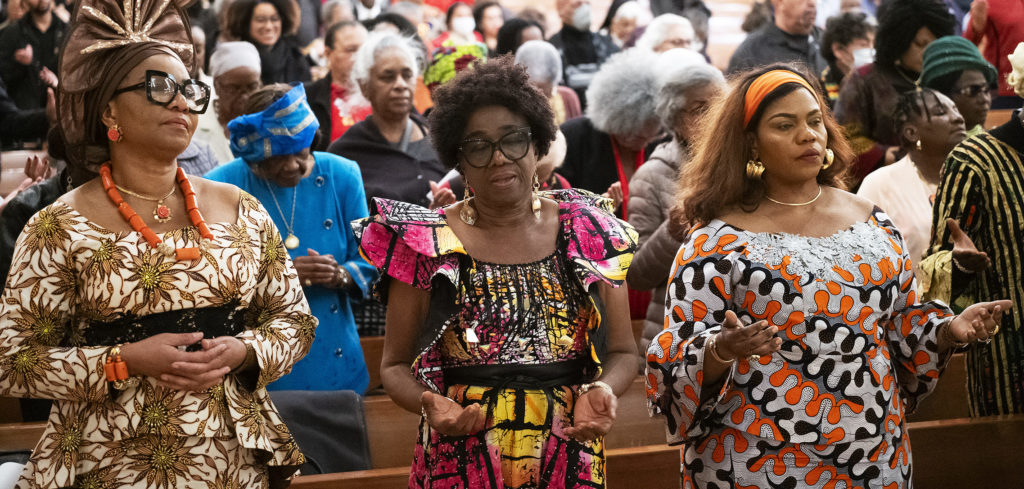On Feb. 10 at the Cathedral of Our Lady of the Angels, Archbishop José H. Gomez celebrated the 22nd Annual Black History Mass sponsored by the African American Catholic Center for Evangelization. The following is adapted from his homily.
Black Catholic history is American history. It is American Catholic history. And it is also a chapter in God’s beautiful plan for salvation history.
It is the story of men and women walking together with Jesus Christ in holiness, love, and service, building his kingdom in America.
And this history has created a strong community of faith, not only here in Los Angeles but all across the country — men and women who are keepers of the flame, carrying out the mission of evangelization in our parishes and homes, in our schools and in our communities.
And in this work, we are surrounded by a great cloud of witnesses who have gone before us, holy men and women like the Venerables Henriette Delille and Augstus Tolton, the Servants of God Julia Greeley and Thea Bowman, and so many more.
We still have work to do to break down the barriers of prejudice, in our society, and also in the Church.
But throughout history, holiness has always been God’s response to injustice. So we pray to grow in holiness as we follow ever more faithfully in the footsteps of Jesus Christ.
We ask the intercession of those holy men and women who have gone before us. We ask that they help us to proclaim the beautiful truth that every man and woman is a child of God, made in his image, no matter what the color of their skin or the place where they were born.
And Jesus gives us a powerful picture of that truth in the tender Gospel story of his healing of the leper.
This leper knows that he needs Jesus. He knows that only Jesus can set him free from his illness. He trusts in Our Lord’s healing mercy.
In those days, we know, lepers were forced to live at the margins of society, shunned as “unclean” and forbidden to come in contact with others. But this leper refused to let these social barriers prevent him from meeting Jesus.
He comes to Jesus, kneels down, and begs him with a simple prayer: “If you wish, you can make me clean.”
Jesus is touched by the man’s faith, he is “moved with pity.”
And even though the law of his time forbids Jesus from coming near this man, Jesus not only allows the leper to approach him, he stretches out his hand and touches the man.
He answers the leper’s prayer with such a tender reply: “I do will it,” he says. “Be made clean.”
Nothing can separate us from the love of Jesus!
Jesus came into this world so that every person might seek him and find healing and salvation. He came to make all of us brothers and sisters in the family of God.
This is our work now. This is the mission of every member of the Church.
St. Paul tells us, “Be imitators of me, as I am of Christ.”
There is no better definition of what it means to be a Christian! We are called to live by Our Lord’s words and example, to be imitators of Christ.
The saints say that each one of us must become an “alter Christus,” another Christ.
We see this in the lives of so many of the Black Catholics who went before us.
Each of them was an alter Christus, another Christ, imitating Jesus, spreading the love of God, sharing his mercy, speaking to the hearts of their neighbors in need.
They called the Servant of God Julia Greeley “Denver’s Angel of Charity.”
She was an emancipated slave who used her freedom to serve others, wheeling a little red wagon all around the city, bringing food, clothing, firewood, and more to the poor. Often she would work at night or in secret, leaving her gifts of charity on people’s doorsteps.
Mother Mary Lange, another Servant of God, started schools for African Americans and immigrants. She took care of orphans and cared for the dying and terminally ill.
You and I are called to walk in their footsteps, as they walked in the footsteps of Jesus.
We are called to be peacemakers and healers in our world, as Jesus was. We are called to spread his tender love, to reach across every barrier, to break down the walls of hostility that divide us and keep us apart from others.
So let us honor the proud legacy of our Black Catholic ancestors by continuing their work of building Christ’s kingdom in America.
May holy Mary, our Blessed Mother go with us, and may she help each of us to become more and more an imitator of her Son, and “another Christ.”

